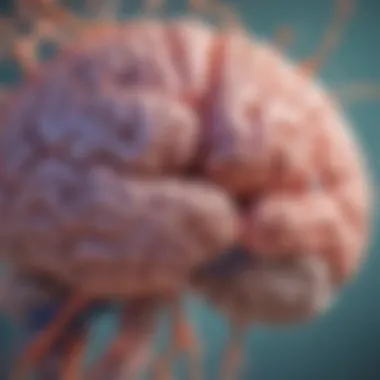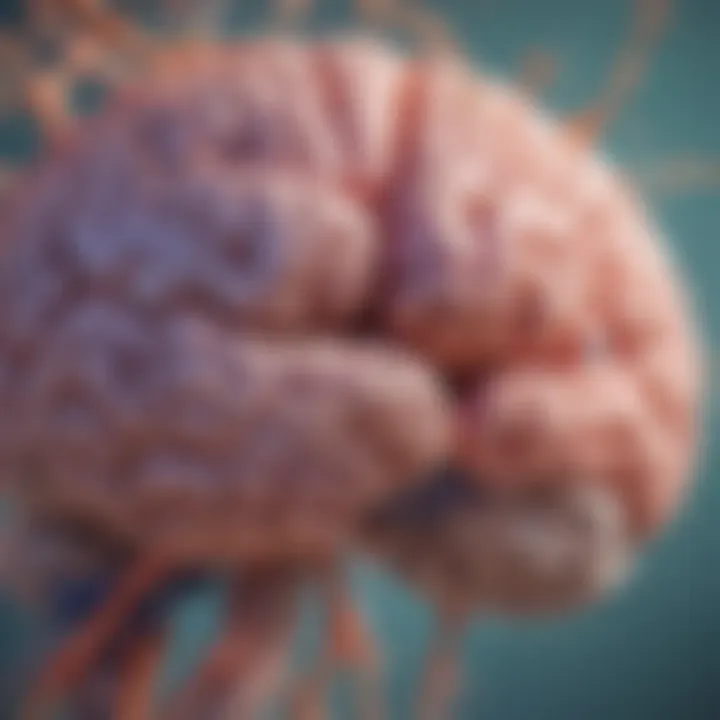Understanding Your Brain: Enhancing Cognitive Efficiency


Intro
The human brain is often described as the most powerful organ we possess, yet its complexities can be staggering. As we go through our daily activities, this magnificent organ constantly processes information, navigates challenges, and drives decision-making. Understanding how various cognitive processes work is not just fascinating; it can be life-changing.
Every day, our brains juggle multiple tasks, sometimes seamlessly and other times with evident strain. From social interactions to work responsibilities, the brain functions meticulously to ensure we operate at peak efficiency. What factors contribute to its performance? How can we maximize our mental capabilities?
This article delves into these inquiries, offering insights into cognitive functioning and strategies for enhancing efficiency. We will explore the different regions of the brain that collaborate during intricate tasks, the science behind multitasking, and the pivotal role that rest and mental well-being play in productivity. By comprehensively unpacking these concepts, our intention is to arm readers with knowledge that can elevate their mental capacity in both personal and professional spheres.
Through engaging narratives and detailed analysis, we will navigate the pathways of cognitive functioning, highlighting not only the efficiency of our brains at work but also ways to foster an environment that supports mental excellence.
The Definition of Cognitive Function
Understanding what cognitive function is lays the foundation for recognizing how our minds operate on a daily basis. Cognitive function encompasses a range of mental processes that include thinking, learning, memory, attention, and problem-solving. Each of these components plays a critical role in how we process information, make decisions, and interact with the world around us. By grasping this concept, one can essentially fine-tune their mental activities to enhance productivity and well-being.
What Constitutes Cognitive Function
At its core, cognitive function is about how our brains process information. It encompasses several key elements:
- Thinking: This is the ability to analyze information, evaluate situations, and form judgments. It allows us to interpret our environment and decide our course of action.
- Learning: Learning encompasses both acquiring new information and adapting existing knowledge based on experience. It’s a dynamic process that fuels our growth.
- Memory: Memory holds all the information we learn, whether it's recalling a friend’s name or recalling how to drive a car. It’s centralized to functioning effectively in our daily lives.
- Attention: Attention dictates where we focus our cognitive resources, determining what we notice and what goes unnoticed, making it vital in all tasks.
Through understanding these elements, we can appreciate how interconnected they are in supporting our mental capabilities.
Types of Cognitive Processes
Cognitive processes can be categorized into several types, all of which contribute to our overall cognitive functions.
Memory
Memory is perhaps the most vital aspect of cognition. It allows us to store experiences and information, making it possible to learn from the past and apply it in the present. What’s significant about memory is that it’s not merely a storage system; it’s also a bridge to emotional and contextual experiences that shape our understanding of the world.
- Key Characteristic: Memory is not static; it changes and adapts with each moment we encounter new experiences.
- Unique Feature: Our memory involves several types, such as short-term and long-term memory, each serving different functions, from holding immediate information to securing long-lasting knowledge.
- Advantage: A strong memory aids in learning and enhances performance across various domains, allowing us to navigate complex environments with confidence.
- Disadvantage: However, memory can be fallible—misremembering or forgetting can pose challenges in important situations.
Attention
Attention is the spotlight of our cognitive functioning. It allows us to concentrate on specific tasks while filtering out distractions. Attention is especially crucial in fast-paced environments where multiple stimuli vie for our focus.
- Key Characteristic: Attention is selective and can be easily divided or shifted, making it important in multitasking scenarios.
- Unique Feature: This process is limited; there’s only so much we can focus on at a time, which can create challenges in complex problem-solving.
- Advantage: Effective attention management enhances performance, particularly in situations requiring quick decision-making and concentration.
- Disadvantage: On the flip side, distractions can significantly impair our attention, leading to mistakes and decreased efficiency.
Perception
Perception is the way we interpret sensory information. It’s how we understand and interact with our environment, forming impressions and judgments based on what we see, hear, and feel.
- Key Characteristic: Perception is subjective, meaning it can vary greatly from person to person based on prior experiences and contexts.
- Unique Feature: This process integrates past experiences to influence how we perceive new information, making it essential for learning and adaptation.
- Advantage: A strong perceptual ability allows individuals to navigate complex social situations and develop deep understanding in various subjects.
- Disadvantage: Misinterpretations can occur; what one person perceives as friendly might be seen as aggressive by another.
Decision Making
Decision-making is the culmination of various cognitive processes and is central to our functioning both personally and professionally. It involves choosing between different options based on the information available, often influenced by our emotions and thoughts.
- Key Characteristic: It can be intuitive or analytical, depending on the circumstances and the information at hand.
- Unique Feature: Effective decision-making relies on a blend of rational thought and emotional insight, highlighting the interplay of cognitive processes.
- Advantage: Strong decision-making skills can lead to better outcomes and successful interactions in various aspects of life.
- Disadvantage: Poor decision-making, often resulting from cognitive overload or stress, can lead to suboptimal choices with lasting consequences.
Neuroscientific Foundations of Cognition
Understanding the neuroscientific foundations of cognition is crucial as it serves as the backbone for comprehending how our brain processes information while performing daily tasks. The brain functions as a complex, interconnected system; different regions communicate and collaborate to produce thought, movement, and emotion. This section will shine a light on how our brain's structure and biochemical make-up significantly influences our cognitive capabilities.
Brain Structure and Function
Cortex
The cortex is the brain's outer layer, playing a pivotal role in higher cognitive functions. It's often regarded as the control center where activities like reasoning, problem-solving, and language occur. One characteristic that stands out is its extensive organization into distinct areas tailored for various tasks, which makes it incredibly efficient for covering a wide range of cognitive activities. The unique feature of the cortex is its plasticity, meaning it can adapt and reorganize itself as we learn or experience new things. This flexibility provides substantial advantages, signaling to us that our cognitive capabilities can both grow and change over time, making it a fascinating aspect in our exploration.
Limbic System
The limbic system holds various components vital to emotions and memory. It plays a huge part in not just retaining memories but also processing emotional responses to them. Its key characteristic is the centrality of emotion in cognitive processing. The limibic system’s unique aspect is its ability to influence our decision-making process through emotional experiences, a quality that is often overlooked. Understanding this connection can provide profound insights into why we often experience certain biases or emotional responses during complex cognitive tasks, which can sometimes hinder performance.
Brainstem
The brainstem, often the unsung hero, is essential for regulating vital life functions such as breathing, heart rate, and consciousness. What’s crucial to highlight is that while we might think of cognition as purely mental functions, the brainstem facilitates the flow of information between the brain and the body, thus influencing cognitive efficiency. Its unique position means it operates much like a conductor in a symphony, ensuring that different brain regions can communicate seamlessly. Without this smooth functioning, cognitive tasks can feel overwhelming, slipping away from our control.
Neurotransmitters and Their Role
Neurotransmitters are the chemical messengers that transmit signals across neurons, playing a vital role in how effectively cognitive processes occur. Various neurotransmitters like dopamine, serotonin, and glutamate contribute to mood regulation and cognitive abilities. Their presence—or absence—can significantly alter perception, attention, and memory.
In understanding the role of neurotransmitters, we realize they help maintain cognitive balance. By fostering a deeper comprehension of how these chemicals work, we can look towards strategies for enhancing cognitive performance through lifestyle adjustments and targeted interventions.
The Brain's Energy Demands
The brain, that marvelous organ nestled within our skull, is not just a think tank; it is a powerhouse demanding a significant share of our energy resources. Although it accounts for roughly 2% of our total body weight, it utilizes around 20% of the body’s oxygen and caloric intake. This section is vital as it sheds light on how energy consumption and metabolic processes in the brain influence cognitive functioning. Understanding these demands is crucial for optimizing our mental capabilities, especially in today's fast-paced world.


Metabolism and Cognitive Load
Metabolism refers to the intricate biochemical processes that convert food into energy, a necessity for all bodily functions. In the context of the brain, this energy fuels everything from basic operations like breathing to complex tasks such as problem-solving or strategizing. The brain’s metabolism is particularly sensitive to cognitive load—the mental effort required to perform tasks. When engaged in a cognitively demanding task, the brain’s energy consumption spikes.
Why’s this important? Well, high cognitive load can lead to mental fatigue, affecting attention and decision-making capabilities. Picture it like running a marathon without enough rest; eventually, you hit the wall.
- High Cognitive Load Tasks: These include problem-solving, mathematical computations, or learning new languages. They demand more attention and thus, more energy, leading to quicker fatigue.
- Low Cognitive Load Tasks: Simple tasks, like watching TV or casual reading, require lesser mental resources, thus conserving energy.
A keen awareness of one's cognitive load is vital. Knowing when you’re pushing your mental limits can help in pacing yourself—break up high-load tasks into manageable chunks to maintain productivity without burning out.
Impact of Diet on Brain Function
The relationship between diet and cognitive function is a well-trodden path but often brushed aside. What we fuel our bodies with directly impacts brain performance. Diets rich in essential fatty acids, vitamins, and antioxidants not only nourish the brain but can also enhance its efficiency. There’s really no need for shock; it all circles back to that energy demand we talked about.
Certain foods have been shown to offer substantial benefits, including:
- Fatty Fish: Rich in Omega-3 fatty acids, crucial for brain health.
- Berries: Packed with antioxidants that protect brain cells.
- Leafy Greens: Provide vitamins that support memory and cognition.
- Nuts and Seeds: A great source of energy and healthy fats which also help in maintaining focus.
Conversely, diets high in saturated fats and sugars can impair cognitive processes. These foods can lead to inflammation and other brain functioning issues.
Also, understanding your body’s response to various foods can be a game-changer. It’s worth taking a moment to observe how your mental clarity fluctuates after different meals. Are you sharper after a wholesome breakfast, or do you find yourself dragging along if you skip breakfast?
"The food you eat isn’t just about fueling your body; it’s also about energizing your mind."
In summary, both metabolism and diet play pivotal roles in shaping cognitive function by managing how efficiently the brain operates. Recognizing these energy demands can help personalize productivity strategies that are vital for students, professionals, and anyone looking to harness their mental faculties to the fullest.
Cognitive Efficiency and Task Management
In today's fast-paced world, the concept of cognitive efficiency is becoming increasingly vital. The ability to manage tasks intelligently and effectively can have a profound impact on productivity and mental well-being. Maintaining cognitive efficiency means utilizing mental resources in a way that maximizes output while minimizing wasted effort. This delicate balance is essential for every professional and student striving for success.
Cognitive efficiency incorporates various considerations, such as mental fatigue, focus, and the prioritization of tasks. Understanding how to manage these elements can lead to significant improvements in not just task completion, but also in the enjoyment and satisfaction derived from work. Navigating through cognitive load while managing diverse tasks is no small feat, but with the right strategies in place, it can be achieved with greater ease.
Understanding Mental Fatigue
Mental fatigue is like a fog that can roll in, blocking clarity and dimming the brain’s functioning abilities. It creeps up after prolonged periods of concentration or multitasking, leaving one feeling drained and less productive. Recognizing the signs of mental fatigue is crucial. Common indicators include decreased motivation, poor concentration, and increased irritability. Once you understand what mental fatigue looks like, you can take steps to address it.
Strategies such as taking regular breaks and practicing mindfulness can help restore cognitive resources. Just as a car cannot run efficiently on an empty tank, neither can the brain function optimally when fatigued.
Strategies for Enhancing Focus
Enhancing focus is paramount in achieving cognitive efficiency. Below are two popular methods that help individuals fine-tune their concentration and manage tasks more effectively.
Pomodoro Technique
The Pomodoro Technique is a well-known time management method that breaks work into intervals, traditionally 25 minutes in length, separated by short breaks. This approach promotes sustained focus while allowing for necessary refreshment.
A defining characteristic of the Pomodoro Technique is the rhythmic alternation between work and rest. It encourages a mindset that sees productivity as a series of intense bursts rather than a constant grind. This makes it a favored choice for many looking to stay productive throughout the day.
Its unique feature lies in its simplicity. Setting a timer creates a structured environment that can alleviate anxiety related to open-ended tasks. However, some may find the rigid timer overly constraining, as not all tasks fit neatly into 25-minute blocks.
Time Blocking
Another valuable strategy is Time Blocking. This involves allocating specific time slots for different tasks throughout the day. Unlike to-do lists, which can often lead to a never-ending cycle of distractions, time blocking provides clear visibility into one's schedule, fostering a sense of control and intention.
A key characteristic of time blocking is its flexibility; it can accommodate changes and interruptions without derailing the entire day. This method allows users to break the day into manageable chunks, directing focus on one task at a time. It suits those who often feel overwhelmed by a long list of responsibilities.
But this technique does come with its challenges. If a task takes longer than expected, it can disrupt the rhythm rather than enhance it. Users should be prepared to adjust and remain adaptable.
Effective cognitive task management is the pathway to unlocking one’s full potential in both personal and professional life.
Incorporating these strategies into your routine can work wonders in boosting cognitive efficiency. Knowing which approach resonates with you can aid in constructing a more organized, productive workflow. As the landscape of work continues to evolve, understanding and managing one’s cognitive capabilities becomes ever more crucial.
Multitasking Myth vs. Reality
In our fast-paced world, multitasking has become a buzzword. It’s the go-to strategy for many individuals, espically in today's evolving work environment. However, contrasting popular belief, multitasking might not be the golden ticket to increased productivity. This section delves into understanding the multitasking myth, its cognitive limitations, and how better task management can foster efficiency.
Cognitive Limitations of Multitasking
When we talk of multitasking, it's crucial to recognize that our brains have inherent limitations. They can only manage so much information at once. Studies suggest that humans can effectively shift focus between tasks, but doing so inevitably takes a toll. Here are some insights on the cognitive drawbacks of juggling multiple tasks:
- Attention Fracturing: Each time you switch from one task to another, about 20% of mental energy goes in navigating back to the original focus. It’s like trying to read two different books at the same time; you're bound to miss details in each.
- Increased Error Rates: Trying to do too much often leads to mistakes. Research indicates that when individuals multitask, their error rates can jump as high as 50%. In high-stakes environments, errors can have serious consequences.
- Decreased Productivity: A study by the American Psychological Association shows that multitasking can result in up to a 40% reduction in work performance. The brain simply takes longer to complete tasks when switching gears regularly.
"The brain does not handle distractions effectively, and each vague interruption means our response time gets longer."
Optimal Task Grouping
An alternative to the juggling act is optimal task grouping. This method involves sorting out tasks based on their similarities or requirements. Here’s why grouping tasks can be more beneficial:


- Cognitive Familiarity: When similar tasks are tackled together, it reduces the cognitive strain that comes with switching contexts. For instance, making phone calls, answering emails, and attending to paperwork can all be grouped into an administrative block. By focusing on these like tasks at once, efficiency can see a notable uptick.
- Time Management: Grouping tasks enhances time management. By creating blocks of time dedicated to specific types of tasks, individuals can sidestep unnecessary context switching. This means less mental strain and the ability to get more done in a shorter span.
- Enhanced Flow State: Engaging in one type of task for an extended period can lead to a state of flow, where focus is heightened, creativity flourishes, and the work can feel almost effortless.
The Role of Memory in Daily Functioning
Memory plays a crucial role in practically every aspect of human life. Whether you're recalling past experiences, learning new information, or planning your future, the ability to store and retrieve information is foundational. In the landscape of cognitive functioning, memory serves as the bedrock upon which learning and daily functioning are built. Without effective memory mechanisms, even the simplest tasks become cumbersome and challenging. Understanding how memory operates not only enhances personal efficiency but also equips individuals to deal with various life demands more effectively.
Types of Memory: Short-term and Long-term
Memory can be broadly categorized into short-term and long-term types, each serving distinct functions. Short-term memory, also known as working memory, is like a mental notepad that allows you to hold and manipulate a limited amount of information temporarily. This type of memory is essential during quick decision-making processes or when you're trying to follow a conversation. For example, when you remember a phone number just long enough to dial it, you are utilizing short-term memory.
In contrast, long-term memory stores information over extended periods and includes everything from facts and experiences to skills and learned behaviors. Long-term memory is further divided into explicit (or declarative) memory, which involves facts and events, and implicit (or procedural) memory, which consists of skills and tasks like riding a bicycle. The ability to transfer information from short-term to long-term memory is vital for learning and personal development.
Techniques for Memory Enhancement
Effective memory enhancement techniques can significantly improve cognitive performance. Here are two powerful methods that can aid in memory retention:
Mnemotechnics
Mnemotechnics refers to the art of memory enhancement through specific strategies designed to improve the recall of information. A common example is the use of acronyms—think of "HOMES" to remember the Great Lakes: Huron, Ontario, Michigan, Erie, and Superior. The key characteristic of mnemotechnics is its structured approach, which makes information easier to remember by associating it with familiar items.
The unique feature of mnemotechnics lies in its adaptability. Users can personalize mnemonic devices to fit their specific learning styles, making it a highly beneficial technique within this article's context. However, there are disadvantages as well; over-reliance on these techniques might lead individuals to forget the original information if the mnemonic is not strong enough or relevant.
Spaced Repetition
Spaced repetition is another outstanding technique for improving retention in long-term memory. This method involves reviewing information at strategically spaced intervals rather than cramming all at once. This approach utilizes the psychological spacing effect, which demonstrates that people learn better when they study over a period rather than in a single session.
The key characteristic of spaced repetition is its focus on timing. By revisiting material at set intervals, retention is improved without overwhelming the cognitive system. The unique feature of this technique is its algorithmic nature; many digital platforms utilize spaced repetition systems to optimize learning schedules based on individual performance. On the flip side, one notable disadvantage is that it requires commitment and discipline to stick to a review schedule, which some may find challenging.
In summary, understanding memory types and employing effective enhancement techniques can dramatically influence daily functioning, enabling smoother learning processes and better recall in both personal and professional settings.
Emotional Intelligence and Cognitive Performance
Emotional intelligence (EI) encapsulates a person's ability to recognize, understand, and manage their own emotions while also being able to recognize and influence the emotions of others. It plays a significant role in how we think, act, and interact, particularly in demanding environments. In the context of cognitive performance, integrating EI not only enhances our interpersonal relationships but also enriches our cognitive capabilities. High emotional intelligence fosters better communication, teamwork, and adaptability, factors that are essential for achieving peak performance in any task.
Understanding Emotional Intelligence
Emotional intelligence can be subdivided into several components that work in harmony to facilitate effective functioning. These components include:
- Self-awareness: This refers to the ability to recognize one's own emotions and their impact on thoughts and behavior. Individuals with high self-awareness can remain balanced, which fosters sound decision-making.
- Self-regulation: This involves managing one’s emotions, maintaining control even in stressful circumstances. People who demonstrate self-regulation can process cognitive functions without being clouded by negative emotions.
- Social skills: The capability to build and maintain healthy relationships is a key component. Strong social skills contribute to teamwork, negotiating conflict, and inspiring others, which are vital in professional settings.
- Empathy: Understanding the feelings of others and responding appropriately helps in creating supportive environments as well as boosts collaboration.
- Motivation: A drive to achieve for the sake of achievement promotes perseverance and resilience in the face of challenges.
Acquiring emotional intelligence can be a game-changer. Taking stock of personal emotional responses and getting comfortable with vulnerability can lead to a greater capacity for understanding others, ultimately enhancing cognitive performance.
Effect of Emotions on Cognition
Emotions and cognition are deeply intertwined. Our feelings influence how we process information, make decisions, and even how we remember events. When emotions run high, cognition can be disrupted in several ways:
- Memory encoding: Strong emotional experiences can enhance memory retention, while negative emotions might hinder the encoding of new information. Individuals might struggle to focus on learning when anxiety or anger clouds their mind.
- Focus and attention: Emotional states can sharpen focus or create distractions. A person in a joyful state may find it easier to concentrate, while someone in distress might find their thoughts scattered, leading to decreased cognitive efficiency.
- Decision-making: Strong emotions can skew judgment. Fear may lead to overly cautious behavior, while excitement could lead to impulsive choices. Striking a balance between emotion and logic is crucial in making sound decisions.
"Emotional intelligence is not about being nice or weak; it's about being honest and clear-headed in amidst chaos."
In practical settings, leveraging emotional intelligence can convert potential cognitive pitfalls into opportunities for enhanced performance. Engaging with emotions constructively augments memory, decision-making, and overall cognitive processing, proving that the mind's ability isn't just about intellectual acumen but also about emotional balance.
The Impact of Stress on Cognitive Function
Stress is often viewed as a double-edged sword; while it can drive individuals to perform at their best, excessive stress might be a major hindrance to cognitive abilities. In today’s fast-paced world, understanding this delicate balance is critical, particularly for students, professionals, and anyone striving for peak performance. The relationship between stress and cognitive function is complex and multifaceted, affecting everything from memory to decision-making aptitude.
Chronic stress, for instance, can lead to an overload of the brain's resources, impacting the efficiency with which we process information. Recognizing the implications of stress not only lays the groundwork for addressing its effects but also highlights the need for strategies to harness stress positively.
Stress Response Mechanism
When the body perceives a threat, whether real or imagined, it activates a set of physiological responses commonly known as the fight-or-flight response. This involves the release of stress hormones, like cortisol and adrenaline, which prepare the body for immediate action.
These hormones have several effects:
- Increased Heart Rate: To pump more blood and oxygen to vital areas.
- Heightened Alertness: The release of adrenaline sharpens focus, temporarily boosting cognitive processing speed.
- Shutdown of Non-Essential Systems: Processes like digestion slow down, prioritizing resources for critical fight-or-flight functions.
However, this heightened state, if prolonged, can wreak havoc on cognitive performance. Specifically, excessive cortisol can disrupt synaptic functioning and even damage hippocampal neurons, which play a crucial role in memory consolidation. Over time, this can lead to difficulties in focusing, problems with working memory, and an overall decline in decision-making abilities. The transient, energizing aspects of stress may turn into a cognitive burden that clouds judgment and impairs learning.
"Stress may just be the catalyst for some to thrive, while for others, it becomes the weight that pulls them down."
Managing Stress for Better Performance
Finding effective ways to manage stress is paramount to preserving cognitive function. Here are several strategies that can help mitigate the detrimental effects of stress, ultimately leading to improved mental acuity:
- Mindfulness and Meditation: These practices help ground individuals, facilitating a calmer response to stressors. Daily meditation, even for just a few minutes, can significantly decrease cortisol levels.
- Physical Exercise: Engaging in regular physical activity is a powerful antidote to stress. Exercise boosts endorphins, which naturally elevate mood and can help clear the mind.
- Proper Time Management: Planning tasks and using techniques like prioritization can reduce the overwhelming feelings that often accompany tight deadlines.
- Social Support Networks: Talking with friends, family, or professionals creates an outlet for stress and a support framework that can foster resilience.
- Healthy Lifestyle Choices: Balanced nutrition and adequate sleep are foundational to cognitive health. Poor diet and sleep deprivation can worsen stress effects, leading to a downward spiral.
By recognizing stress sources and proactively employing these strategies, individuals can not only navigate life's challenges more effectively but also enhance their cognitive performance. In a world where the demands often outstrip our resources, managing stress becomes not just beneficial, but essential.


Rest and Recovery: Essential for Cognitive Function
In the whirlwind of modern life, the emphasis on productivity often overshadows a crucial element of cognitive performance: rest and recovery. Just as a race car needs to refuel and have its tires checked before hitting the track again, the human brain requires time to recharge. When thinking about cognitive efficiency, it’s clear that neglecting rest can lead to diminished performance, increased mistakes, and an overall decline in mental acuity.
Effective rest can take many forms, but its benefits stretch well beyond simply closing your eyes for a few hours. Not only does rest contribute to physical well-being, it plays an essential role in the brain’s functioning. Adequate recovery facilitates improvements in concentration, memory retention, and emotional well-being. Simply put, a well-rested brain is a productive brain.
The Importance of Sleep
Sleep is often viewed as a luxury, something we forgo when caught up in work or social commitments. Yet, treating sleep as an afterthought can be detrimental. Sleep isn’t just a downtime for the body; it’s an active period for the brain. During various sleep stages, particularly REM sleep, the brain processes information, consolidates memories, and clears out toxins that accumulate during waking hours.
Key Benefits of Quality Sleep:
- Memory Consolidation: While we sleep, our memories transition from short-term to long-term storage, cementing learning that occurs throughout the day.
- Emotional Regulation: Lack of sleep can skew emotional responses, leading to irritability and decreased resilience under stress.
- Cognitive Restoration: During sleep, brain cells undergo maintenance processes that support essential functions like problem-solving and decision-making.
In the grand scheme, prioritizing sleep can significantly improve cognitive performance. As an added bonus, sleep deprivation has been linked to a higher likelihood of poor decision-making and risk-taking behavior.
Mindfulness and Cognitive Restoration
In recent years, mindfulness has gained traction as a popular technique to enhance mental clarity and restoration. Mindfulness refers to the practice of focusing one’s awareness to the present moment without judgment, creating a pause in the hustle and bustle of life. It’s a simple yet profound way to assist the brain in recovering from the constant stimulation of daily life.
Practicing mindfulness can include activities such as meditation, yoga, or merely taking time to breathe deeply and reflect. One advantage of mindfulness is its ability to reduce stress. High levels of stress are notorious for hindering cognitive function, leaving individuals feeling foggy and overwhelmed. By regularly engaging in mindfulness practices, the mind can achieve a sort of reset, facilitating improved focus and emotional control.
"Mindfulness isn't about getting anywhere else. It's about being where you are.”
Techniques for Implementing Mindfulness:
- Breath Awareness: Spend a few minutes each day focusing solely on your breathing. Notice the sensations and let thoughts come and go without attaching to them.
- Guided Meditation: Use apps or online resources to find guided meditations that can help you through various aspects of mindfulness.
- Nature Walks: Engage with nature and immerse yourself in the sights, sounds, and smells, grounding your awareness.
Incorporating rest and mindful practices into a daily routine doesn't just serve cognitive function; it refines it. The overarching theme is clear: adequate rest and mindful awareness are not mere suggestions but rather fundamentals of effective cognitive functioning.
Technological Enhancement of Cognitive Abilities
In today’s fast-paced world, the interplay between technology and cognitive abilities has gained remarkable attention. The infusion of digital tools into our daily routines has shaped how we process information and accomplish tasks. There’s no denying the significance of understanding how these technologies can serve as cognitive extensions of our abilities. Embracing technological enhancement can ultimately lead to improved productivity and efficiency, provided we navigate this landscape wisely.
Digital Tools for Productivity
Digital tools have become lifelines for many, serving varied purposes in augmenting cognitive functions. Applications such as Evernote and Trello help organize thoughts and tasks, allowing users to keep track of projects effortlessly. These platforms utilize visual aids, reminders, and collaborative features to streamline workloads. They not only save time but also enhance recall and concentration by offering structured environments for task management.
Furthermore, tools like RescueTime analyze how time is spent on different tasks, helping individuals identify areas to improve productivity. By highlighting patterns in how we engage with technology, users can take actionable steps to adapt their habits.
Some other noteworthy technologies include:
- Mind Mapping Software: Tools like XMind can help visualize complex ideas, enhancing creativity and comprehension.
- Note-taking Apps: OneNote allows for seamless organization of notes linked to tasks and deadlines.
- Calendaring Tools: Google Calendar simplifies scheduling and reminds us of important commitments, reducing the cognitive load of remembering every detail.
Ultimately, these digital tools do not just serve as a means to an end; they enhance our brain's ability to manage information efficiently. They create environments where focus can thrive, boosting our overall cognitive performance.
Limitations of Relying on Technology
While technology is a boon, it’s critical to recognize its limitations. Over-reliance on digital tools can sometimes lead to a shallower engagement with tasks. For instance, consistently using spell-checkers may weaken our writing skills over time. Each tap on a screen does not build the same cognitive pathways as traditional methods do.
Moreover, excessive screen time is often linked to cognitive fatigue. The phenomenon dubbed digital burnout is a real concern; it’s easy to feel drained after hours of interactive demands from various applications. Therefore, while these tools offer efficiency, they can paradoxically contribute to decreased mental stamina.
It’s also important to consider the potential distractions that come with tech-use. Notifications and alerts bombard us, fragmenting our attention. This can hinder deep work, making it harder to focus on complex cognitive processes.
In essence, a balanced approach to technology is essential. Users must remain conscious of how these tools impact their cognitive capabilities. Integrating technology in moderation enables us to harness its benefits while mitigating its downsides.
"Technology, like any tool, is only as good as its wielder. Ensure that it amplifies your potential, not diminishes it."
Being aware of both sides allows individuals to craft a personal approach, where they utilize tools to enhance their cognitive strengths but aren’t ensnared by the pitfalls that come with them.
The Future of Cognitive Science
As we gaze into the horizon of cognitive science, it becomes clear that the landscape is shifting, much like the tide that washes onto the shore. The importance of this field cannot be understated; as our understanding of the brain deepens, it opens doors to numerous possibilities, from enhancing educational practices to improving workplace productivity. Cognitive science is at the crux of merging disciplines like psychology, neuroscience, and artificial intelligence. This intersection creates a fertile ground for innovation that promises tangible benefits for both individuals and society at large.
Emerging insights into the complexities of cognitive function hold the potential to further optimize our mental capabilities. From the advent of brain-machine interfaces to advancements in neuroplasticity, understanding how the brain adapts can revolutionize how we approach learning and skill acquisition. Additionally, these developments can lead to personalized learning experiences that cater to individual cognitive strengths and weaknesses, ultimately fostering a more effective educational environment.
Emerging Research Frontiers
The exploration of cognitive science is akin to charting the uncharted waters of an ocean. Researchers are diving into areas that previously seemed far-fetched or outright impossible. Some of the most riveting fields under investigation include:
- Neuroergonomics: This area focuses on how people interact with technology and environments. It merges cognitive neuroscience with ergonomics, aiming to design tools and workspaces that enhance mental performance.
- Cognitive Rehabilitation: Studies are uncovering methods to help individuals recover cognitive function following injury or illness. Techniques such as virtual reality are being explored as effective rehabilitation tools.
- Artificial Intelligence and Machine Learning: Understanding human cognition is guiding advancements in AI. Algorithms designed to mimic cognitive processes can lead to smarter systems, which in turn might enhance human decision-making.
As we stand on the edge of these frontiers, it becomes evident that the future of cognitive science is poised to be rich with transformative discoveries that could fundamentally alter our educational paradigms and work practices.
Ethical Considerations in Cognitive Enhancement
In the rush to enhance cognitive abilities, it’s crucial not to overlook the ethical implications that arise. As the potential for cognitive enhancement through technology evolves, so too does the concern about access and inequality. Not everyone has the same access to these advancements, which could widen the gap between those who can afford enhancements and those who cannot.
Furthermore, the use of cognitive enhancers may invite concerns regarding authenticity and the integrity of personal achievement. Some potential ethical questions include:
- Safety and Regulation: How do we ensure that cognitive-enhancing products are safe for consumption? What regulatory frameworks are needed to protect consumers?
- Privacy: As cognitive enhancement often involves data collection and analysis, how do we safeguard personal information?
Beyond these concerns lies a philosophical quandary about what it means to augment human cognition. As we paddle into this murky water, we must weigh the benefits against the moral implications. The advancement of cognitive science should be pursued with caution and a commitment to ethical principles, ensuring that we improve cognitive functioning responsibly.















